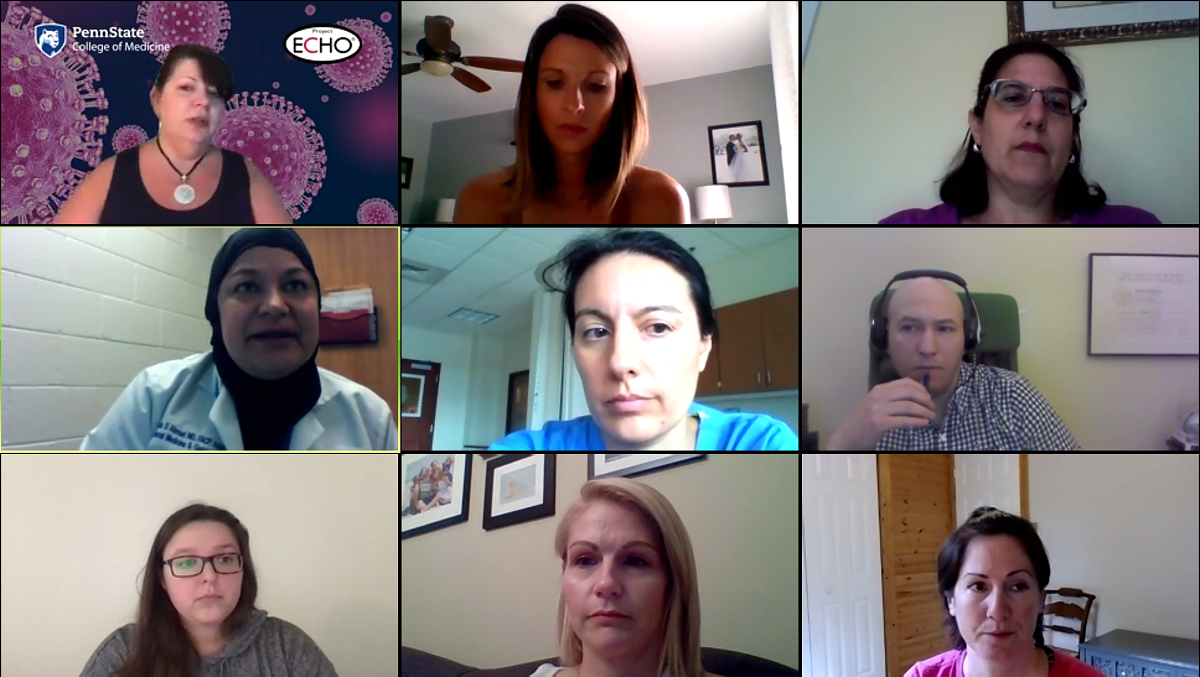Project ECHO unites providers to serve vulnerable communities amid pandemic

When Penn State Project ECHO’s (Extension for Community Healthcare Outcomes) team of six staff members mobilized to address the COVID-19 pandemic in mid-March, director Dr. Jennifer Kraschnewski could never have guessed they would offer sessions almost every day for a month.
“Information about COVID-19 changes quickly,” said Kraschnewski, a professor of medicine at Penn State College of Medicine. “There’s a lot of things to consider from proper use of personal protective equipment to how to assess and care for COVID-19 patients who are hospitalized.”
Project ECHO, a telementoring network, originated at the University of New Mexico in 2003 and came to Penn State in 2018 as a means for experts to disseminate critical information on treating opioid use disorder to primary health care providers in rural settings.
As of mid-April, more than 700 participants from 31 states and six countries had registered for the COVID-19 series. With the help of nearly 40 specialists who volunteered their expertise, topics discussed ranged from outpatient management of COVID-19 patients to methods for medical students to contribute during the pandemic and the latest information on clinical research for COVID-19 therapies. As more people joined and more research and statistics about the epidemiology of the outbreak became available, Kraschnewski said the diversity of the sessions evolved as well.
The platform typically uses case studies, or real-life anonymous patient scenarios, to teach other health care professionals best practices for diagnosing and treating certain conditions. But during the pandemic it has been used to communicate with a variety of different audiences, including community residents.
Targeted sessions
Project ECHO presented a series of sessions on caring for loved ones with COVID-19 at home. Organizers designed the sessions and presented them in Spanish and Nepali to appeal to communities in Dauphin, Lebanon and Berks counties where Hispanic and Nepali populations need critical information on prevention and management of COVID-19 symptoms in their native languages. Hispanic and Nepalese people are at disproportionately higher risk for contracting COVID-19. The Project ECHO team consulted community leaders to identify information gaps and provide the experts and resources.
As the pandemic progressed, epidemiologists and public health experts began to notice that long-term care facilities and nursing homes were vulnerable to outbreaks. Recent data from the Pennsylvania Department of Health showed more than half of COVID-19-related deaths in the state had occurred in nursing homes.
To address the disparity, Project ECHO leaders decided a separate series for staff, administrators and providers in skilled nursing facilities was essential. They covered topics including infection control, what to do when the first positive case of COVID-19 is diagnosed in a facility, how to isolate and care for COVID-19 patients before and after hospitalization, proper personal protective equipment, risk assessment and crisis planning.
Essential information
A colleague invited Dr. Daniel Haimowitz, a geriatrician and internal medicine physician, to join the Project ECHO webinars. He serves as medical director for several long-term care facilities in the greater Philadelphia area. Haimowitz says he finds value in sharing experiences and building new collaborations with other health care professionals who are responding to the pandemic in nursing facilities and assisted living communities.
“Talking to colleagues to get the latest information in a crisis is essential,” Haimowitz said. He had been working on developing a plan for medication management, only to find out that experts from other states were doing the same thing. That led to the development and presentation of a Project ECHO webinar on the subject.
“The sessions connect people who are trying to answer the same questions and help us share information with each other,” Haimowitz said. “It’s validating to know that many of my peers are facing similar challenges and that we can share what has or has not worked for us.”
Building on success
Kraschnewski wants to build on the success of the skilled nursing series and measure whether Project ECHO can improve infection control in nursing homes. She recently submitted a research grant proposal to determine whether the telementoring network can help with implementation of infection control guidelines in nursing homes. Sixteen different stakeholders backed the proposal, including nursing home residents and their families, nursing home staff and administrators, three state agencies, and three state professional organizations.
“Nursing homes are where our most vulnerable and impacted population in the pandemic live,” Kraschnewski said. “As guidelines continue to change, I believe that ECHO will allow us to communicate essential information to the front line staff who need it most in these vulnerable settings.”
Click here to learn more about Penn State Project ECHO and register for an upcoming session.
If you're having trouble accessing this content, or would like it in another format, please email Penn State Health Marketing & Communications.
